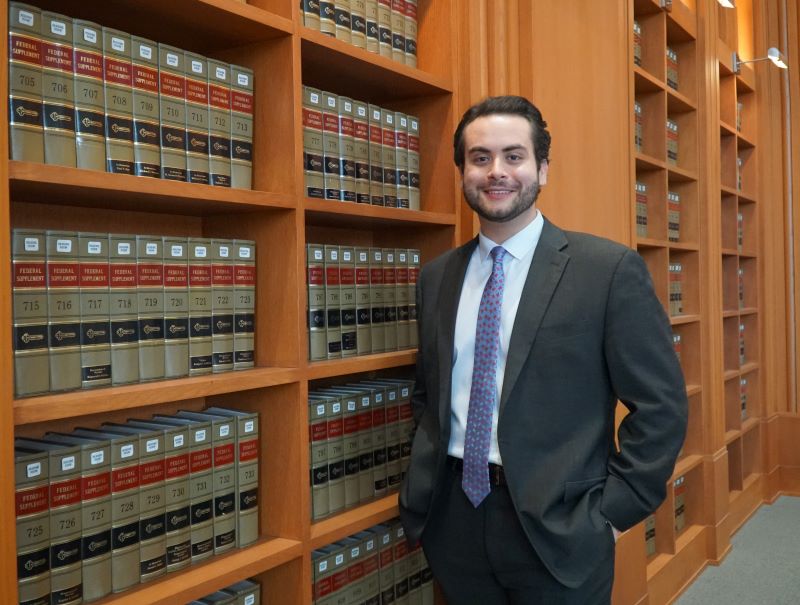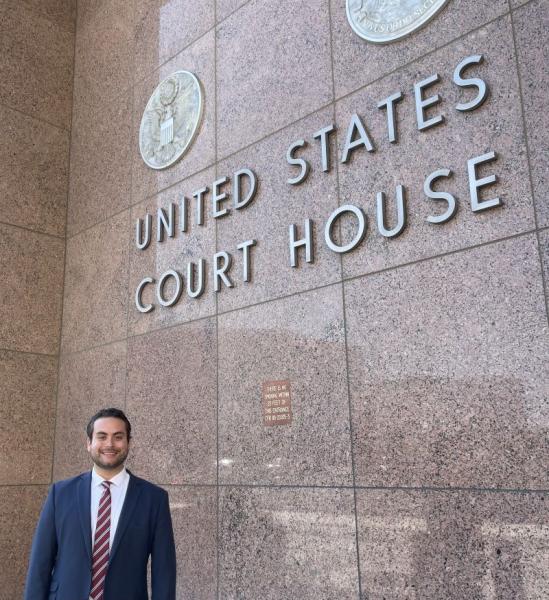Home / Tulane Law Review names first Latino editor-in-chief
Tulane Law Review names first Latino editor-in-chief
February 08, 2024 4:00 PM
|

Pablo Gonzales (L'25) is a first-generation law student, the son of a Mexican American family from Texas, and the first Latino to become Editor in Chief of the flagship journal, the Tulane Law Review. (Photo: Alina Hernandez)
Second-year law student Pablo Gonzales has been elected editor-in-chief of Volume 99 of the Tulane Law Review, the first Latino and Mexican American to lead the school’s flagship journal in its 109-year history.
“Being selected for membership on Law Review was already exciting, but being chosen by your peers to lead is an incredibly humbling honor,” Gonzales said.
“We are so proud of Pablo for his election to editor-in-chief,” said Interim Dean Sally Richardson. “He follows in the footsteps of great leaders of the Tulane Law Review, pioneers in their own right, and I know Pablo will add to the Review’s incredible legacy.”
Gonzales (L'25) was born and raised in Dallas, the youngest son of a Mexican American family and the first to attend law school. The Tulane Law Review has produced judges, attorneys, and practitioners who have gone on to shape the law of this country—including one of Tulane Law’s most esteemed graduates, Judge John Minor Wisdom (L’29).
As he considered his new appointment, Gonzales recognized how his family and community’s history were shaped by the work of journal alumni like Judge Wisdom.
Following the 1960’s Civil Rights Movement, Gonzales’ maternal grandfather, a Baptist pastor, worked alongside local attorneys to continue advocating for civil rights within the Latino community in Dallas. It was Judge Wisdom and the other “Fifth Circuit Four” judges, known for their commitment to civil rights, that significantly influenced the legal landscape of the American South during that time. Judge Wisdom's rulings advanced equal rights in the circuit, which includes Dallas, and upheld the cause of civil rights Gonzales’ grandfather and many others were working towards.
“Wisdom’s jurisprudence informed my grandfather’s and subsequently my community’s experiences,” said Gonzales. “My family history – my community – were reflections of Judge Wisdom and the Fifth Circuit Four’s bold stance to uphold the promise of civil rights.”
From a young age, Gonzales admired attorneys and the role they played in advocating for their communities.
“I remember my first perceptions of attorneys as being helpers,” Gonzales said. “They were the ones people called upon for help, and they always seemed to have the answers.”
His family impressed upon him the importance of education and service. He graduated from Baylor University with a bachelor’s degree in journalism, and from Southern Methodist University with a master’s in education.
“I found a passion for advocacy through my journalism and writing courses,” said Gonzales, who was the editor of a student magazine at Baylor called The Bundle. And it was during that time that his professors began to point him in the direction of law school.
After graduation, Gonzales spent three years as a public school kindergarten teacher with Teach for America in Dallas
“I did not know what to expect,” he said, “but I loved it. It was an amazing, life-changing experience. Teaching made my passion for advocacy grow stronger.”
During his Teach for America commitment and while in graduate school, Gonzales was awarded a Fulbright Scholarship to teach English in Mexico. Through Fulbright, he taught English to graduate students at the Instituto Politécnico Nacional in Mexico City. Additionally, he used his Fulbright experience to volunteer as a paralegal at an immigration nonprofit and teach social and emotional wellness courses at a migrant’s shelter for families and children.
By the end of his Fulbright year, he knew he was ready to go to law school. He looked for a nationally recognized program with smaller class sizes that had a strong sense of community and service.
“Tulane just fit,” he said. “It had a national focus with an offering in international law, and I respected the school’s commitment to service through the pro bono requirement.”
Tulane Law was the first in the nation to require pro bono service as part of graduation, and that commitment is strong to this day.
As a first-year student, Gonzales discovered an interest in legal writing. He sought guidance and mentorship from his Legal Research and Writing Professor, Assistant Dean for Career Development Vanessa Beary. She encouraged him to participate in the summer write-on competition at the end of his first year for consideration for membership on the Tulane Law Review.

As the flagship journal, the Review is a student-run journal that publishes legal scholarship from academics, practitioners, and students in a variety of areas of the law. Articles published by law reviews often analyze recent court decisions, legislative developments, and trends in the legal field. Law reviews are frequently cited by legal professionals, judges, and other scholars as authoritative sources of legal analysis and commentary. And, in the case of the Review, the Supreme Court of the United States.
Participation in law review offers law students the opportunity to refine their legal research, writing, and editing skills. Law review membership is among the most prestigious credentials for law students and can often enhance a student’s resume and career prospects.
“I remember feeling intimidated because the selection process seemed very daunting,” Gonzales said.
Another professor, however, encouraged him once again. Property law scholar and interim Law Dean Sally Richardson pulled him aside toward the end of his first year.
“She said 'it’s going to be hard; it’s going to be a lot of work just after exams',” Gonzales recalled. " 'But you need to do the write-on.' ”
The process to write-on to the the journal comes at a time when most first-year law students are exhausted after final exams. They must participate in a writing competition that begins three days after the last final exam of the spring semester, preparing a case note: a piece of scholarly writing providing commentary and analysis of a judicial opinion. They also must take part in a grammar and legal citation exercise. All of this work, from start to finish, takes about three weeks.
“My conversation with Pablo is a conversation I have every year with dozens of students,” said law Dean Richardson. “The selection process is a lot of work because being a student editor on the Review or any journal is a lot of work. But it is rewarding work. Yes, there are resume benefits. Yes, it opens up opportunities. But there are also the purely academic benefits of working on honing your skills in research and writing which are the bread and butter of what lawyers do.”
Gonzales got the call that he would be invited to join the junior editors of the journal just a few weeks after write-on had ended.
“I’ll never forget how I felt when I got the call,” Gonzales said. “It was very special to share the excitement with my family and fellow classmates. All the work from the first year of law school and the write-on competition paid off.”
Last summer, Gonzales worked as a judicial intern for the Hon. Karen Gren Scholer at the United States District Court for the Northern District of Texas in Dallas. When he arrived back at Tulane for his second year, he joined the junior member class with the most diverse representation in the history of the Review.

Karen Gren Scholer at the U.S. District Court for the
Northern District of Texas.
“It is an absolute privilege to be part of this junior member class,” Gonzales said. “We may have made history as the most diverse junior member class, but we will certainly not be the last.”
As editor-in-chief, Gonzales will join the ranks of the numerous federal and state judges, attorneys, and practitioners who have held this position. His goals start with scholarship, of course: to continue to strong legal scholarship, elevate work that is important to historically underrepresented groups and build upon the Law Review’s masthead topics in international and comparative law, admiralty law, and civil law –which has a rich heritage in Louisiana. Additionally, as he is hoping to set a great foundation for the journal's 100th volume.
But he also wants to foster inclusion and diversity within the Review and the other journals, where junior members will feel welcome and eager to write-on. And, as the end of spring semester approaches, he is on a personal recruiting mission among the 1L class.
“It is vital to ensure that first-year students know that there is a place here for them, that they are supported and are surrounded by people who want them to succeed in reaching their goals,” Gonzales said. “My hope is that they recognize their rightful place here and understand the valuable perspectives they can contribute to legal scholarship.”
Gonzales is excited to usher in another successful year in the history of the Tulane Law Review, but first, he has some plans at the end of spring. This summer, he will join the Dallas office of Wick Phillips as a summer associate in the litigation group and is in the process of applying for judicial clerkships post-graduation.